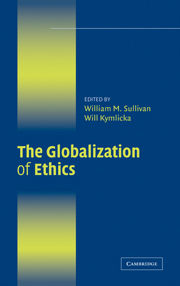Book contents
- Frontmatter
- Contents
- Contributors
- Acknowledgments
- 1 Introduction: The Globalization of Ethics
- 2 Global Ethics and the International Law Tradition
- 3 Morality and Universality in Jewish Thought
- 4 Globalization and Christian Ethics
- 5 Buddhism and the Globalization of Ethics
- 6 Muslim Perspectives on Global Ethics
- 7 Confucianism: Ethical Uniformity and Diversity
- 8 Natural Law, Common Morality, and Particularity
- 9 Liberalism and the Globalization of Ethics
- 10 Feminist Perspectives on a Planetary Ethic
- 11 Ethical Universalism and Particularism: A Comparison of Outlooks
- Appendix: Key Documents on Global Ethics
- A Universal Declaration of Human Rights
- B International Covenant on Civil and Political Rights
- C International Covenant on Social, Economic and Cultural Rights
- D Declaration Toward a Global Ethic
- E Universal Islamic Declaration of Human Rights
- F Cairo Declaration on Human Rights in Islam
- G The Bangkok Declaration
- H Asian Human Rights Charter: A People's Charter
- Bibliography
- Index
D - Declaration Toward a Global Ethic
Published online by Cambridge University Press: 03 September 2009
- Frontmatter
- Contents
- Contributors
- Acknowledgments
- 1 Introduction: The Globalization of Ethics
- 2 Global Ethics and the International Law Tradition
- 3 Morality and Universality in Jewish Thought
- 4 Globalization and Christian Ethics
- 5 Buddhism and the Globalization of Ethics
- 6 Muslim Perspectives on Global Ethics
- 7 Confucianism: Ethical Uniformity and Diversity
- 8 Natural Law, Common Morality, and Particularity
- 9 Liberalism and the Globalization of Ethics
- 10 Feminist Perspectives on a Planetary Ethic
- 11 Ethical Universalism and Particularism: A Comparison of Outlooks
- Appendix: Key Documents on Global Ethics
- A Universal Declaration of Human Rights
- B International Covenant on Civil and Political Rights
- C International Covenant on Social, Economic and Cultural Rights
- D Declaration Toward a Global Ethic
- E Universal Islamic Declaration of Human Rights
- F Cairo Declaration on Human Rights in Islam
- G The Bangkok Declaration
- H Asian Human Rights Charter: A People's Charter
- Bibliography
- Index
Summary
Endorsed by the Parliament of the World's Religions in Chicago, September 4, 1993.
The Principles of a Global Ethic
Our world is experiencing a fundamental crisis: A crisis in global economy, global ecology, and global politics. The lack of a grand vision, the tangle of unresolved problems, political paralysis, mediocre political leadership with little insight or foresight, and in general too little sense for the commonweal are seen everywhere: Too many old answers to new challenges.
Hundreds of millions of human beings on our planet increasingly suffer from unemployment, poverty, hunger, and the destruction of their families. Hope for a lasting peace among nations slips away from us. There are tensions between the sexes and generations. Children die, kill, and are killed. More and more countries are shaken by corruption in politics and business. It is increasingly difficult to live together peacefully in our cities because of social, racial, and ethnic conflicts, the abuse of drugs, organized crime, and even anarchy. Even neighbors often live in fear of one another. Our planet continues to be ruthlessly plundered. A collapse of the ecosystem threatens us.
Time and again we see leaders and members of religions incite aggression, fanaticism, hate, and xenophobia – even inspire and legitimize violent and bloody conflicts. Religion often is misused for purely power-political goals, including war. We are filled with disgust.
We condemn these blights and declare that they need not be.
- Type
- Chapter
- Information
- The Globalization of EthicsReligious and Secular Perspectives, pp. 236 - 246Publisher: Cambridge University PressPrint publication year: 2007
- 2
- Cited by



